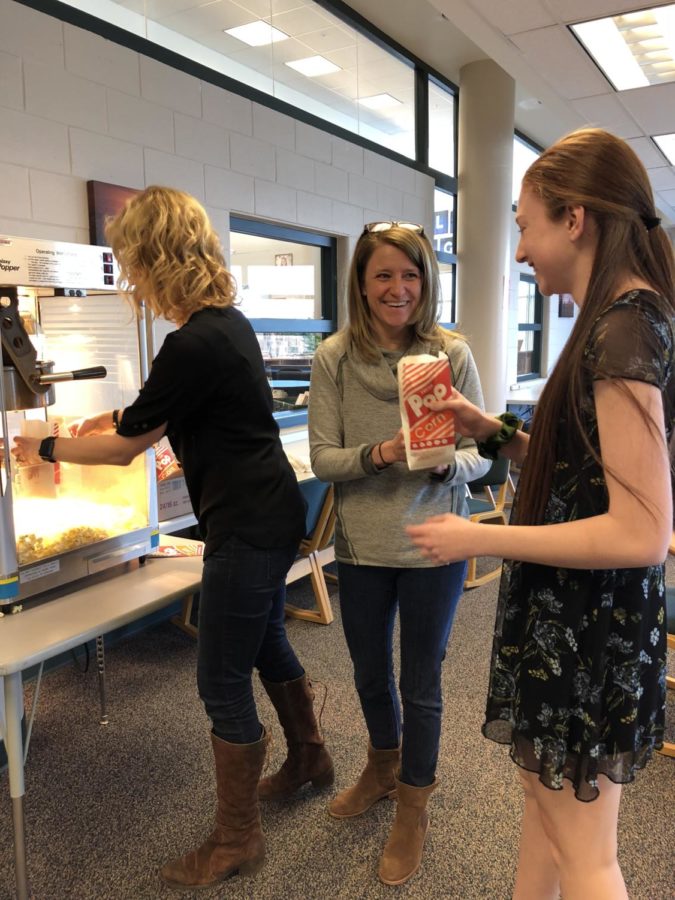Time for juniors to “khan-centrate” on Camp Khan
Caitlin Fagel (11) receives popcorn from Ms. Curry and Ms. Bellito on a special day where popcorn was served at Camp Khan.
VHHS juniors are gearing up to take the school-provided SAT on April 10. Leading up to this, the school is trying to prepare students through Khan Academy’s free Official SAT practice and “Camp Khan” in the IRC from Jan. 22 to April 10.
College Board and Khan Academy collaborated to create this free program, comprised of sample questions with hints, video lessons and full-length practice tests. The practice has a personalized study plan based on your PSAT/NMSQT score.
A big selling point for this practice is the potential score increase. On its website, Khan Academy states that using its practice to study for 20 hours is associated with an average 115-point score increase from the PSAT to SAT.
“To my knowledge, it’s a resource that most high schools are promoting because it is high-quality and free,” Ms. Bellito, college and career counselor, said. “It’s personalized and makes the experience appropriate for each user just by linking College Board and Khan Academy accounts.”
Last week, some students received letters that they were required to “report to the IRC to work on the Khan Academy SAT prep program” during their lunch study hall, Monday through Thursday until April 5.
This requirement is an example of academic intervention, an educational support system that the school provides to ensure students’ success. So, the school has identified some students that they think will benefit from more SAT prep.
“We have several academic interventions in the building, and that is based on our perception of how much of a benefit it’s going to provide to them. The goal is we want as many students to be as successful as possible on the April SAT,” Mr. O’Brien, assistant principal for curriculum and instruction, said.
To encourage students to use the official SAT practice, there will be a rewards system of sorts. These incentives are the school’s way of motivating students to reach the 20-hour goal, said Bellito. The rewards and deadlines haven’t been finalized yet, but there is a general plan so far.
After 10 hours, students can get free pizza. After 15 hours, there will be a free breakfast. After 20 hours, students can go on a junior lunch release. For juniors that don’t have a full lunch period, they will still receive some type of reward for logging 20 hours.
“We definitely want them to have some sort of benefit. I could offer them the CRC, for example, to eat lunch if they wanted to order out,” Bellito said. “We’re open to other ideas, too.”
To receive the awards, students must link their Khan Academy account to an assigned teacher account, but only the hours from Jan. 22 to April 5 will count.
The IRC will be open to juniors during their lunch periods for a designated space and time to use the Khan Academy practice. Students will be allowed to eat lunch in the IRC, and there will be days where hot chocolate or popcorn will be served.
After April 5, the IRC will go back to being an open-resource area for students, O’Brien said. It will not be limited to only Freshman Transition.
The state-mandated SAT is in the spring. By then, many juniors will have already taken the ACT or SAT on their own. Students have been questioning the SAT’s importance in comparison to the ACT.
The SAT does matter, Bellito explained, and one should prepare and try their best. However, the extent of preparation depends on which colleges one is applying to. Most schools allow for test choice, but more prestigious ones like the UC schools and Yale do require your full test history. However, even when applying to a college that requires all test scores, they will usually only look at the highest score.
“It’s very rare that a college would require every test,” Bellito said. “What’s more typical is that schools will say they’ll always look at the highest score, so not to be afraid of sending more than one. Kids can send their scores for free to four places when they test, and sometimes, kids are hesitant to agree to send a score before they see [it].”
Nonetheless, students understand that it is worth putting in the time now, as they will feel the need to take the test over again if they do not do well.
“We’re already forced to take [the SAT], so you might as well do well on it,” said Max Xu (11).

